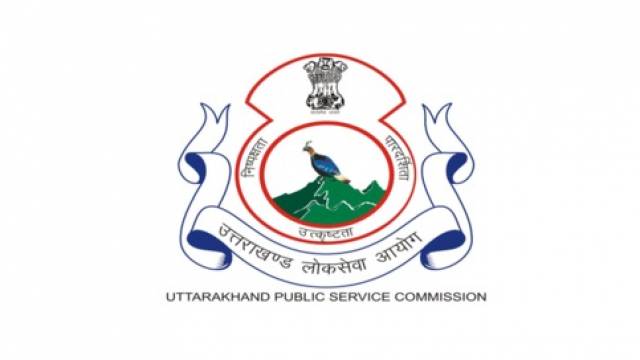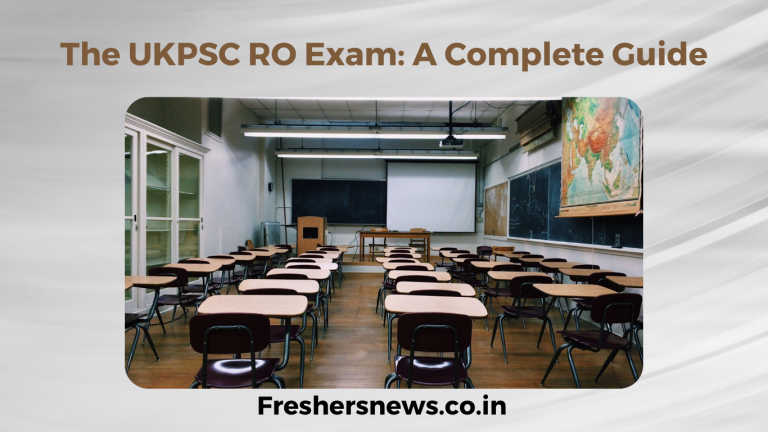Have you set your dream of serving Uttarakhand as a review officer? If so, you must plan to qualify for the Uttarakhand Public Service Commission Review Officer [RO] exam, which will be the gateway to your dream career. This blog will equip you with all the essential information to navigate the RO confidently. Here we are talking about The UKPSC RO Exam: A Complete Guide.

We are discussing The UKPSC RO Exam: A Complete Guide:
Eligibility Criteria for the UKPSC RO
- Educational Qualification-> A bachelor’s degree from a recognized university.
- Age Limit-> According to the latest notification, the minimum age limit is 21, and the maximum is 35, with a government-recommended relaxation for reserved category candidates.
- Domicile-> You might be required to be domiciled in Uttarakhand.
Exam Pattern for UKPSC RO
- Preliminary Exam-> General Knowledge, Reasoning Ability, and General Hindi.
- Main Exam-> essay writing, short answer questions, and case studies relevant to the RO position.
- Practical Test-> skills required for the RO role, depending on the nature of the post.
Important Dates for UKPSC RO
- Notification Release Date-> September 8th, 2023
- Application Submission Window-> September 8th, 2023–September 29th, 2023
- Preliminary Exam Date-> December 17th, 2023
How to prepare for the UKPSC RO
- Understand the syllabus and examination pattern.
Making a clear concept regarding “what to study.” “How will it be asked?”
- Create a study plan.
Once you have the perfect materials, you must create a study plan. This will help you stay on track and cover all the crucial topics. Your study layout has to be realistic and achievable, and it is necessary to plan practical time for every analysis of a new topic and revise what you have already learned.
- Self-study or coaching
Students’ most common questions are how to prepare for the RO exam and whether to take coaching. The best decision will be a combination of both. RO is not included in your school’s curriculum. Therefore, coaching will guide your preparation by providing relevant study materials and tests. Then, you can solve exercises and review materials to study independently.
- Work on the fundamentals.
Developing fundamental concepts should be prioritized before moving on to RO exam-level questions. So, focus on studying basic concepts and practicing easy questions first. Then, gradually move on to higher-level questions.
- Practice lots of questions.
After completing a topic, practice asking as many questions as possible. Move from lower to higher-difficulty questions. Reviewing the concepts a few times through practice can help you prepare for the RO exam.
- Analysis of the test
A practice test is a simulation of the real test. As the exam approaches, taking practice tests regularly should be part of your RO preparation strategy. Additionally, it is equally important to analyze your simulations and identify your weaknesses.
- Practice regularly
One of the best approaches to preparing for the RO examination is to practice answering questions regularly. You can do this by solving exercise papers and taking mock tests. Many special exercise papers and mock tests are available online and in books.
- Stay motivated.
It is essential to be stable, active, and motivated throughout your preparation.
- Focus on your weak areas.
As you start answering questions, you will perceive your weak areas. Once you know your weak areas, you can focus your research on these topics. You will additionally need to get additional exercise material for these topics.
- Stay up-to-date on current affairs.
The RO examination also asks for current affairs. Therefore, it is essential to be updated on modern events. You can use newspapers, observe information channels, and follow information websites and social media pages to stay updated.
About the syllabus of the UKPSC RO exam
Prelims Exam Syllabus:
- General Studies and Computer Knowledge-> Indian History, Polity, Economy, Geography, Science, and Current Affairs. Basic knowledge of computers and their applications is also tested.
- History of India and the Indian National Movement-> The history of India, covering ancient, medieval, and modern periods. It also emphasizes the Indian National Movement and the struggle for independence.
- Indian Polity and Economy-> Indian Constitution, political system, Panchayati Raj, and broad features of the Indian economy and planning.
- Geography and Demography of India-> India’s geographical features, ecological aspects, socio-economic conditions, and demographics.
- Current Events-> national and international current affairs, including significant events in Uttarakhand.
Mains Exam Syllabus (may vary depending on the specific RO post):
- General Science and Technology-> scientific concepts and their applications in various fields.
- Basic knowledge of computers and their application in development-> role of computers in development initiatives.
- History and Culture of India and Uttarakhand-> This section covers the history and culture of India, with a specific focus on Uttarakhand.
- Indian National Movement, Relation with Other Countries (Especially Neighboring Countries) After Independence-> India’s Freedom Struggle and its Relationship with Other Countries, Particularly Neighboring Nations, in the Post-Independence Era.
- Geography and Population of India and Uttarakhand-> India’s and Uttarakhand’s geographical features and demographics
- Disaster management and mitigation (ecosystem, environment, and natural calamities)-> disaster management strategies and mitigation techniques for environmental and natural disasters
- Indian Polity and Economy-> intricacies of the Indian political system, the polity of Uttarakhand, the Panchayati Raj Act, and the economy of Uttarakhand.
- Current Affairs-> national and Uttarakhand-specific issues.
Which books should I prefer for the UKPSC RO exam?
General Studies and Current Affairs:
- “India’s Struggle for Independence” by Bipan Chandra
- “Lucent’s General Knowledge” by Lucent Publications
- “Manorama Yearbook” by Malayala Manorama
Indian Polity and Economy:
- “Indian Polity for Civil Services Examinations” by M. Laxmikanth
- “Indian Economy” by Ramesh Singh
History of India and Uttarakhand:
- “History of Modern India” by Bipan Chandra
- “History of Uttarakhand” by Shekhar Singh Rawat
Geography of India and Uttarakhand:
- “Certificate of Physical and Human Geography” by Goh Cheng Leong
- “Uttarakhand: A Geographical Appraisal” by Savita Kumari
Science and Technology:
- “NCERT Science textbooks (Class 6-10)” by NCERT
- “General Science and Technology” by Lucent Publications
Reasoning Ability:
- “A Modern Approach to Verbal and Non-Verbal Reasoning” by R.S. Aggarwal
Current Affairs:
- Newspapers-> The Hindu, The Indian Express, and The Times of India
- Magazines-> Yojana, Kurukshetra
Common mistakes to avoid in the UKPSC RO
- Before analyzing the examination pattern, questions, and syllabus -> It is important to have a clear concept of the study program and which topics to focus on.
- Not managing time effectively-> time management is essential in any competitive exam.
- Not practicing regularly-> One excellent method for preparing for the RO examination is to practice answering questions regularly.
- Making common mistakes-> Concentrating and avoiding careless mistakes in any competitive exam is crucial.
- Not focusing on weak areas-> As you practice answering questions, you will become aware of your weak areas.
FAQs
What is the selection procedure after the written exam?
After the written exam, shortlisted candidates are referred to an interview and then document verification. The interview normally assesses your personality, conversation skills, subject-specific knowledge, and grasp of current issues. The weight of the written examination and interview may additionally fluctuate depending on the particular notification for every examination year.
How do I crack the UKPSC RO Exam without joining any coaching institute?
- Self-study with structured resources.
- Form study groups or online communities.
- Seek individual mentorship.
- Focus on self-awareness and learning styles.
Mention if there are any reservations or special provisions for specific categories of candidates in the UKPSC selection process.
Yes, the Government of India offers reservations for eligible candidates belonging to:
- Scheduled Castes (SCs),
- Scheduled Tribes (STs),
- Other Backward Classes (OBCs),
- Persons with Disabilities (PwDs).
Mention some sources to find previously asked questions in the RO exam.
- Coaching institutes
- Online platforms
- Mock tests
How do I manage time effectively during my preparation?
- Create a realistic study schedule.
- Utilize your commute or breaks for revision.
- Optimize your study sessions.
- Delegate and prioritize.
- Maintain a healthy lifestyle.
Conclusion
Qualifying for the RO examination is your gateway to achieving your dream job as a review officer in Uttarakhand. This complete blog has equipped you with the information, resources, and techniques to navigate your preparation effectively. Remember, a thorough understanding of the syllabus, strategic study materials, regular practice, and unwavering self-belief are key factors in attaining your goals. Avoid common mistakes, embrace valuable tips, and believe in your abilities to ace the exam. As you embark on this path, devote yourself, prepare diligently, and step up to achieve your dream job of becoming an RO officer. Let’s start your journey today!

